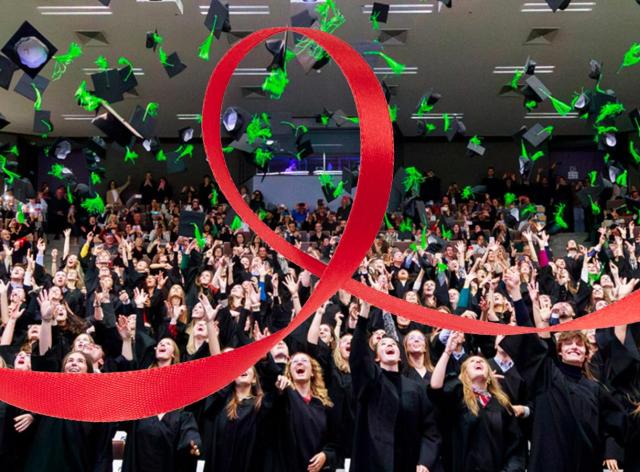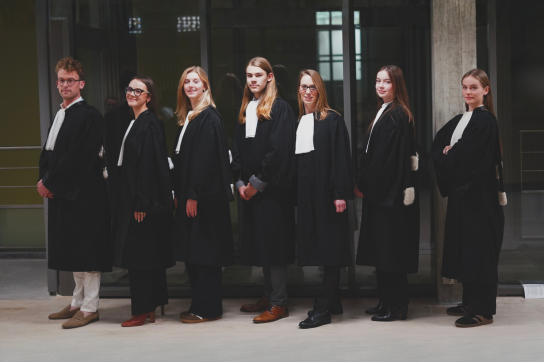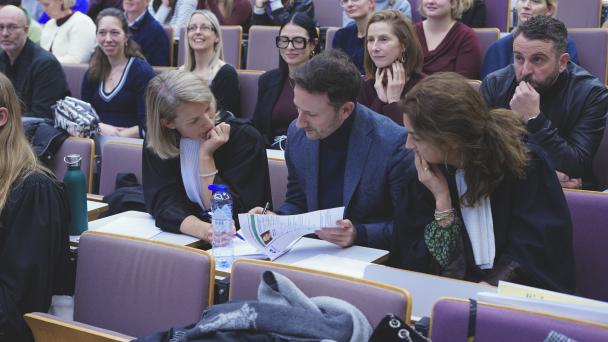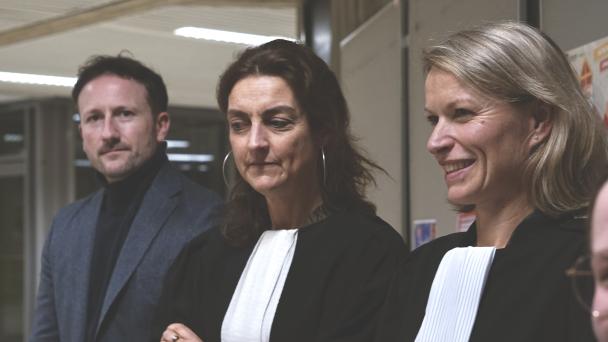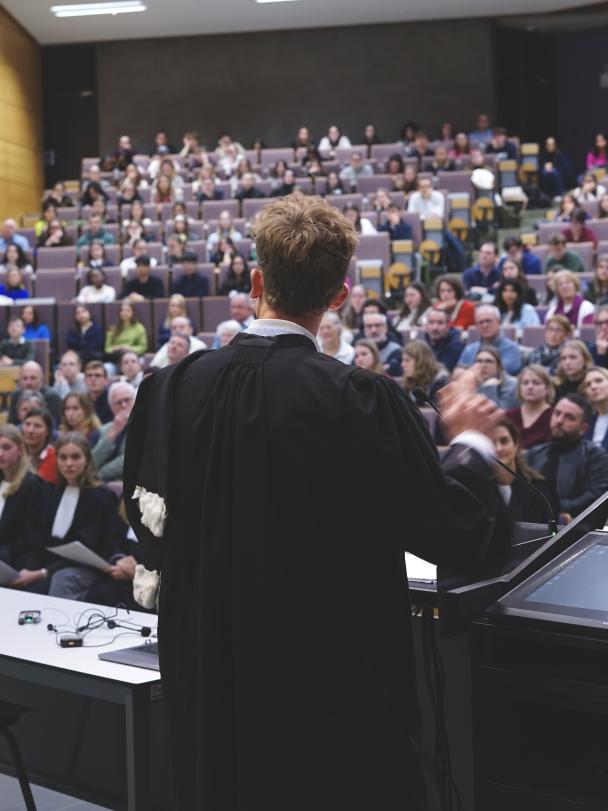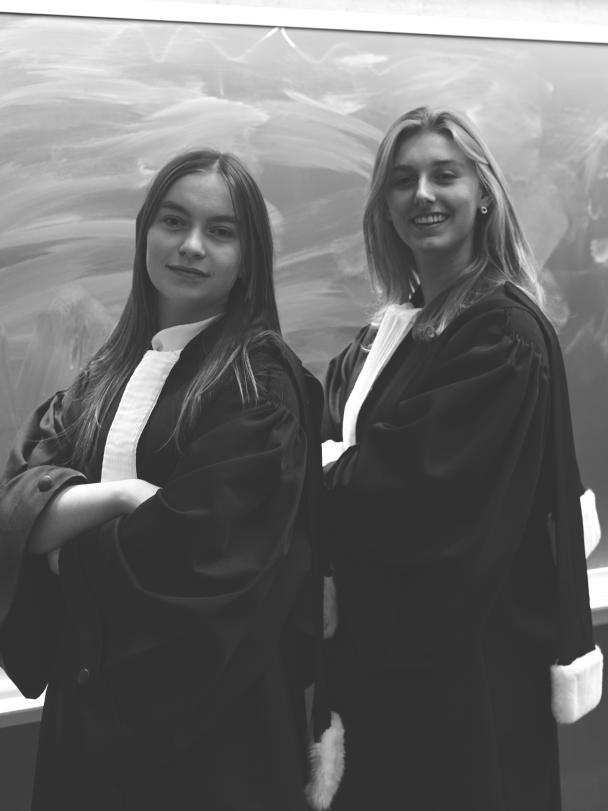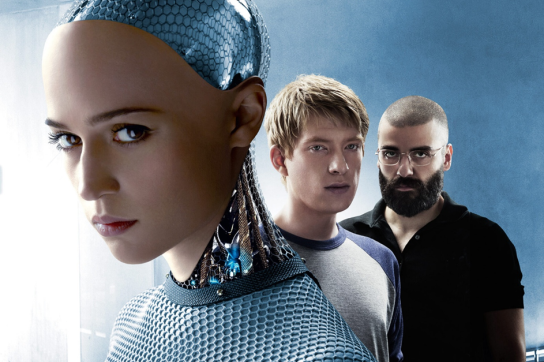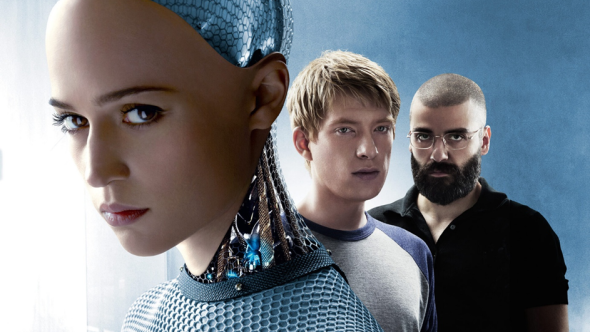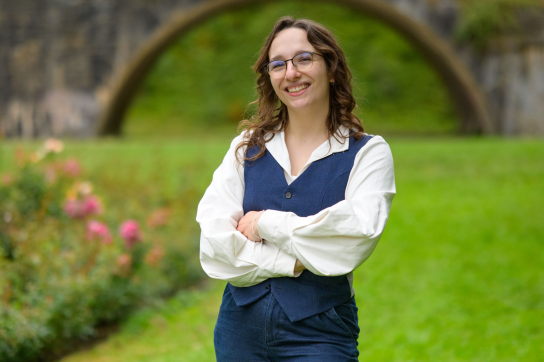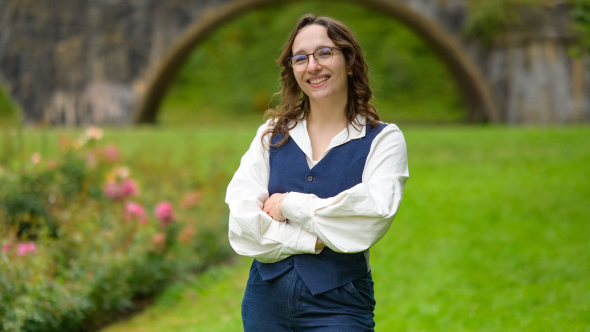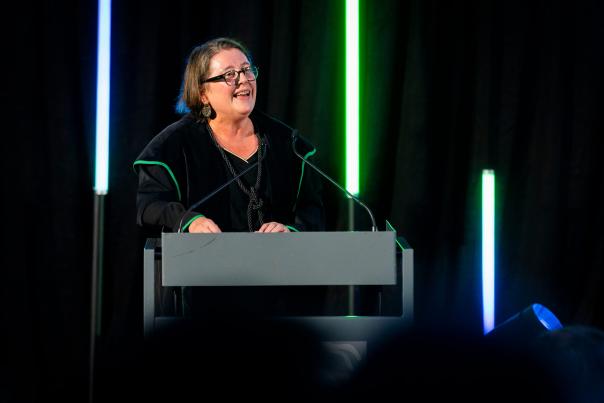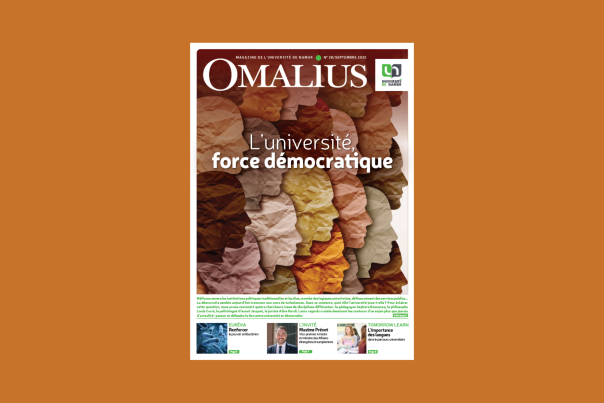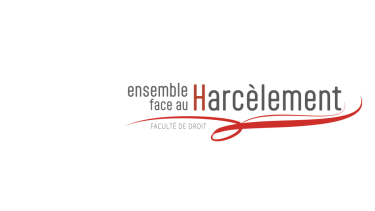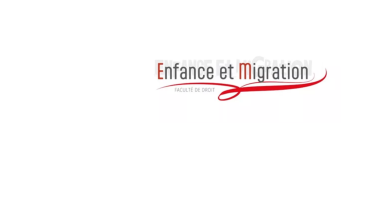Since 2022, the Faculty of Law has chosen a theme for the year that unites the entire Faculty, students and teachers, across all blocks and programs. This theme is used in courses, tutorials, assignments, eloquence tournaments, conferences and educational and cultural activities throughout the academic year. It's an exciting, value-bearing dynamic that makes mentoring at the University of Namur ever more unique.
Thus, in 2022-2023, we have come together around CHILDHOOD & MIGRATION, in 2023-2024, around HARASSMENT in all its forms, in 2024-2025, around INCLUSION, with the aim of enabling everyone.e to find their place in society regardless of race, gender, social class, generation, ability, love and/or sexual preferences,... Over the course of the year, we have been made aware of racism, LGBTQIA+, the less able, the elderly or very young, grossophobia, ...
La thématique 2025-2026 : L'environnement, avec le slogan "Réenchantons la Terre"
Nous avons choisi cette année de mettre au centre de nos initiatives pédagogiques l'ENVIRONNEMENT, un des trois grands piliers du développement durable.
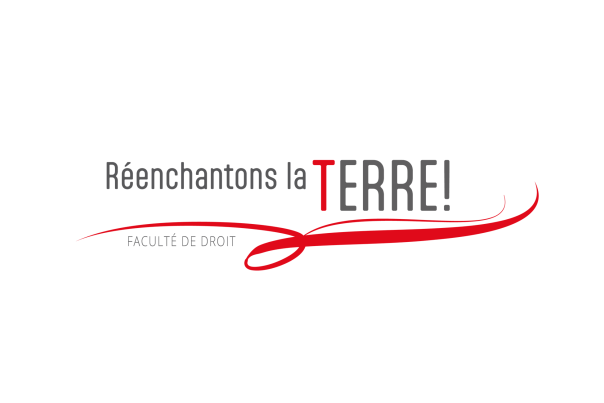
This year we've chosen to put the ENVIRONMENT, one of the three main pillars of sustainable development, at the heart of our educational initiatives.
Objectives
- To bring us together (staggered and daytime schedules; BAC 1, BAC 2 and BAC 3, research centers and specialized masters)
- Dive into practice and make courses concrete
- Conscious that law is a (good) tool in the service of values
- Decompartmentalize subjects in a cross-disciplinary approach
- Become a committed jurist
- Enrich our heads and hearts!
Methodology
- Through the various courses, practical work, assignments (methodo and TFC), by giving concrete expression to the subject matter taught;
- Through the complementary activities on offer: meeting legal professionals, plays, films, debates, .
Activities
- Illustrations and lectures in lectures
- The involvement of numerous specialists who contribute their expertise and insights from the "field"
- Faculty activities alongside courses (mock trial, eloquence tournament, ...)
- Citizen involvement activities (this year: dressing room sale, nomadic donnerie, .... in addition to the solidarity collection initiated last year to meet the needs of Namur's impoverished population during the winter)
- Cultural activities
- Other enriching activities (competition to produce awareness-raising video capsules,...)
Les activités
Interventions externes dans les cours
- Jeudi 5 février 2026 - Cours de droit de l’environnement d’Amélie Lachapelle : présentation du Plan Climat 2030 de la Ville de Namur, suivi d’une discussion avec le service Air Climat Energie de la Ville de Namur.
- Jeudi 19 février 2026 - Cours de régulation et innovations technologiques d'Elise Degrave, visite de l'expo "Plus Vivant" au Delta suivie de la présentation du plan Climat 2030 de la Ville de Namur par Emma Wauthier, la coordinatrice du projet.
- Mercredi 25 février 2026 - Cours de droit économique d'Hervé Jacquemin, intervention de Jean-Marc Gollier, avocat spécialisé en droit de l'environnement, le greenwashing et la responsabilité des entreprises en matière d'environnement.
- Lundi 2 mars 2026 - Cours de droit pénal au D01, intervention de Léa Saussez, conseillère juridique à la Croix-Rouge de Belgique, sur les conséquences environnementales des conflits armés.
- Mercredi 18 mars 2026 - Cours English for Legal Professionals d’Aude Hansel intervention de Cirian Foulds, théologien et activiste.
- Mardi 24 mars 2026 - Cours de SPD d’Elise Degrave, intervention de Renaud Duterme, qui défend la géographie de combat
- Jeudi 7 mai 2026 - Cours de Droit des obligation, intervention de Carole Billiet, avocate spécialisée en droit de l’environnement intervenue dans Klimaatzaak.
Des activités facultaires en marge des cours
- Du 27 novembre 2025 au 2 avril 2026 - Chaire Francqui de la Faculté de droit – Delphine Misonne « Besoin d’environnement, besoin de droit »
- 17 février 2026 – Petit-déjeuner 100% local en collaboration avec le Kot-à-projets Koté Local.
- 16 février 2026 – Tournoi d’éloquence ouvert à toute la faculté
- 25 février 2026 – Atelier numérique durable
- 17 mars 2026 – Conférence sur le climat et la justice climatique
- 15 avril 2026 – Vide dressing à la Fac
Activités des partenaires
- 30 novembre 2025 - Procès fictif du Kot à projet « Les bras droit »
- 19 mars 2026 - Amélie Lachapelle éclaire nos futurs étudiants sur le droit et le développement durable
Au fil de l’année, de l’engagement citoyen
- Récolte de déchets en team building facultaire (printemps 2026)
Des activités facultaires initiées par les étudiants
- Repair café au Cercle
- Troc : « je cherche » & « je donne » au Cercle
- Atelier de confection de divers objets via recyclage
Activités créatives et ludiques
- Concours vidéo en collaboration avec la Ville de Namur (Plan Air Climat 2030)
- Lectures enrichissantes à la bibliothèque de la Faculté de droit
- 15 avril 2026 – Rencontre d’impro et Fête du Fil Rouge au profit d’une association qui défend l’environnement
Spotlight
Agenda
Francqui Chair 2025-2026 in the Faculty of Law | Need for the environment, need for law?
Lesson 3 | Delegalizing pollution: health and climate at the heart of the debate
Speaker: Delphine Misonne, FNRS Senior Research Fellow, Professor at UCLouvain, Director of CEDRE and member of the Royal Academy of Belgium.
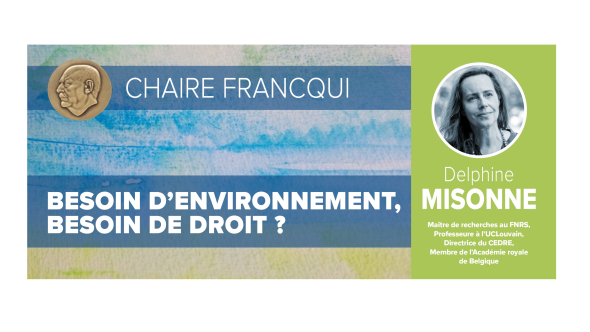
This Francqui Chair offers a fresh perspective on the advances and tensions that characterize the way in which the law currently organizes society's relationship with the environment, as an essential substrate for human life and the balance of ecosystems. Far from presenting this law as having reached its peak, it is its recent major advances that will be discussed, as well as the risks of regression that threaten it. If the ambition to protect the environment has indeed become a legal issue, how are its essential drivers evolving, whether in terms of climate, human health, or the status accorded to nature?
The conference will be followed by a local drink offered by the Cercle de Droit, the Régionale la Binchoise, and the Régionale RTM.
Free event. Registration strongly recommended.
Conference - The Ombudsman: Administrative Mediation
Conference organized by the Namur Lawyers Association.
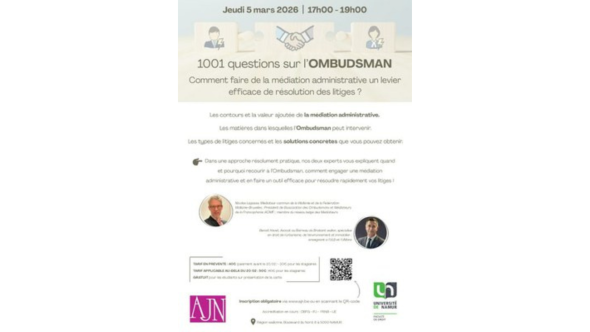
Program
1001 questions about the Ombudsman - How can administrative mediation be used as an effective tool for dispute resolution?
- The scope and added value of administrative mediation
- The matters in which the Ombudsman can intervene
- The types of disputes concerned and the concrete solutions you can obtain.
Taking a resolutely practical approach, our two experts explain when and why to call on the Ombudsman, how to initiate administrative mediation, and how to make it an effective tool for quickly resolving your disputes!
Speakers
Nicolas Lagasse | Joint Mediator for Wallonia and the Wallonia-Brussels Federation; President of the Association of Ombudsmen and Mediators of La Francophonie (AOMF); member of the Belgian network of mediators
Benoit Havet | Lawyer at the Walloon Brabant Bar, specializing in urban planning, environmental, and real estate law; lecturer at the ULB and UMons
Registrations
Registration is required via https://www.ajn.be (payment confirms registration).
- Advance registration fee (payment before February 20, 2026): €40 (€30 for trainees)
- Price after February 20, 2026: €50 (€40 for interns)
- Free for students upon presentation of student ID
Accreditation request in progress for IFJ, OBFG, FRNB, and IJE.
Further information: ajn@unamur.be.
Francqui Chair 2025-2026 in the Faculty of Law | Need for the environment, need for law?
Lesson 4 | Bees, humans, and glaciers
Speaker: Delphine Misonne, FNRS Senior Research Fellow, Professor at UCLouvain, Director of CEDRE and member of the Royal Academy of Belgium.

This Francqui Chair offers a fresh perspective on the advances and tensions that characterize the way in which the law currently organizes society's relationship with the environment, as an essential substrate for human life and the balance of ecosystems. Far from presenting this law as having reached its peak, it is its recent major advances that will be discussed, as well as the risks of regression that threaten it. If the ambition to protect the environment has indeed become a legal issue, how are its essential drivers evolving, whether in terms of climate, human health, or the status accorded to nature?
The conference will be followed by a local drink offered by the Cercle de Droit, the Régionale la Binchoise, and the Régionale RTM.
Free event. Registration strongly recommended.


